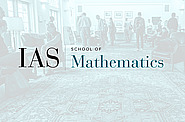2005-2006 seminars
Oct
17
2005
Oct
11
2005
Lie Groups, Representations and Discrete Mathematics
From Ramanujan Graphs to Ramanujan Complexes
Alex Lubotzky
2:00pm|S-101
Oct
11
2005
Oct
10
2005
Computer Science/Discrete Mathematics Seminar I
Randomness Extractors for a Constant Number Independent Sources of Polynomial Min-Entropy
11:15am|S-101
Oct
03
2005
Computer Science/Discrete Mathematics Seminar I
Szemeredi's Regularity Lemma Revisited
Terry Tao
11:15am|S-101
Sep
27
2005
Computer Science/Discrete Mathematics Seminar II
Property Tau and the Product Replacement Algorithm
Alex Lubotzky
10:30am|S-101
Sep
26
2005
Computer Science/Discrete Mathematics Seminar I
Expanders, L-functions, and the Elliptic Curve Discrete Logarithm Problem
Stephen D. Miller
11:15am|S-101
Sep
12
2005
Computer Science/Discrete Mathematics Seminar I
Locally Decodable Codes with 2 Queries and Polynomial Identity Testing for Depth 3 Circuits
11:15am|S-101
